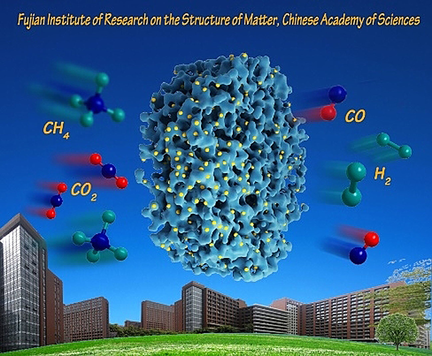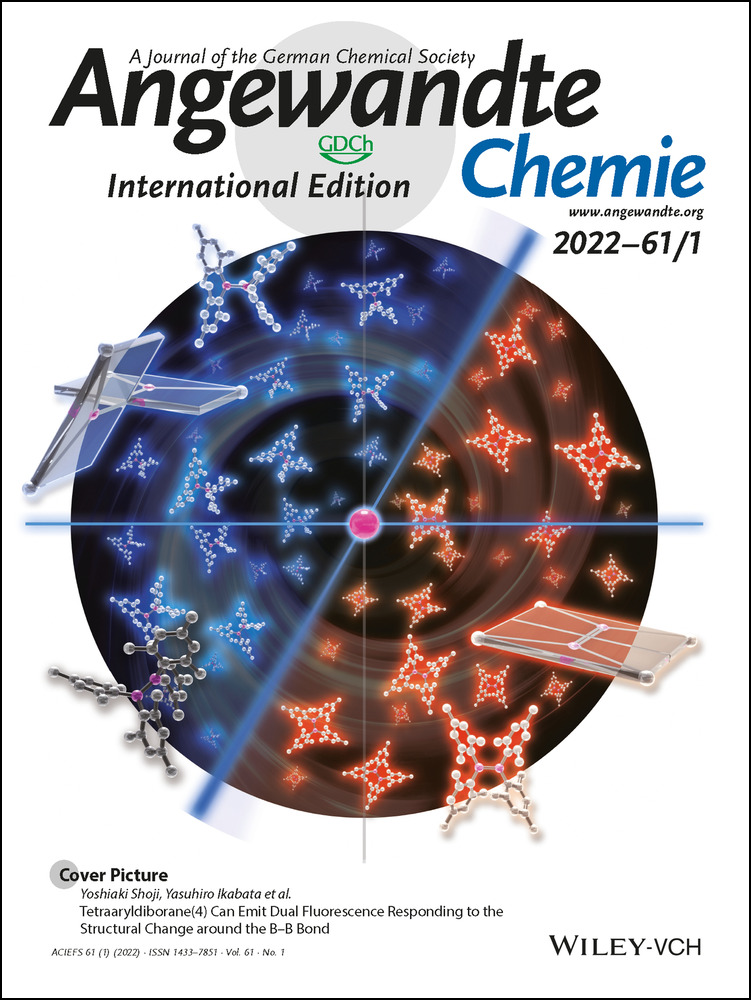Active Exsolved Metal–Oxide Interfaces in Porous Single-Crystalline Ceria Monoliths for Efficient and Durable CH4/CO2 Reforming
Yongchun Xiao
Key Laboratory of Optoelectronic Materials Chemistry and Physics, Fujian Institute of Research on the Structure of Matter, Chinese Academy of Sciences, Fuzhou, Fujian, 350002 China
Key Laboratory of Design & Assembly of Functional Nanostructures, Fujian Institute of Research on the Structure of Matter, Chinese Academy of Sciences, Fuzhou, Fujian, 350002 China
Advanced Energy Science and Technology Guangdong Laboratory, 29 Sanxin North Road, Huizhou, Guangdong, 116023 China
University of Chinese Academy of Sciences, Beijing, 100049 China
Search for more papers by this authorCorresponding Author
Prof. Kui Xie
Key Laboratory of Optoelectronic Materials Chemistry and Physics, Fujian Institute of Research on the Structure of Matter, Chinese Academy of Sciences, Fuzhou, Fujian, 350002 China
Key Laboratory of Design & Assembly of Functional Nanostructures, Fujian Institute of Research on the Structure of Matter, Chinese Academy of Sciences, Fuzhou, Fujian, 350002 China
Advanced Energy Science and Technology Guangdong Laboratory, 29 Sanxin North Road, Huizhou, Guangdong, 116023 China
University of Chinese Academy of Sciences, Beijing, 100049 China
Fujian Science & Technology Innovation Laboratory for Optoelectronic Information of China, Fuzhou, Fujian, 350108 China
Search for more papers by this authorYongchun Xiao
Key Laboratory of Optoelectronic Materials Chemistry and Physics, Fujian Institute of Research on the Structure of Matter, Chinese Academy of Sciences, Fuzhou, Fujian, 350002 China
Key Laboratory of Design & Assembly of Functional Nanostructures, Fujian Institute of Research on the Structure of Matter, Chinese Academy of Sciences, Fuzhou, Fujian, 350002 China
Advanced Energy Science and Technology Guangdong Laboratory, 29 Sanxin North Road, Huizhou, Guangdong, 116023 China
University of Chinese Academy of Sciences, Beijing, 100049 China
Search for more papers by this authorCorresponding Author
Prof. Kui Xie
Key Laboratory of Optoelectronic Materials Chemistry and Physics, Fujian Institute of Research on the Structure of Matter, Chinese Academy of Sciences, Fuzhou, Fujian, 350002 China
Key Laboratory of Design & Assembly of Functional Nanostructures, Fujian Institute of Research on the Structure of Matter, Chinese Academy of Sciences, Fuzhou, Fujian, 350002 China
Advanced Energy Science and Technology Guangdong Laboratory, 29 Sanxin North Road, Huizhou, Guangdong, 116023 China
University of Chinese Academy of Sciences, Beijing, 100049 China
Fujian Science & Technology Innovation Laboratory for Optoelectronic Information of China, Fuzhou, Fujian, 350108 China
Search for more papers by this authorGraphical Abstract
Abstract
Dry reforming of CH4/CO2 provides an attractive route to convert greenhouse gas into syngas; however, the resistance to sintering and coking of catalyst remains a fundamental challenge at high operation temperatures. Here we create active and durable metal–oxide interfaces in porous single-crystalline (PSC) CeO2 monoliths with in situ exsolved single-crystalline (SC) Ni particles and show efficient dry reforming of CH4/CO2 at temperatures as low as 450 °C. We show the excellent and durable performance with ≈20 % of CH4 conversion and ≈30 % of CO2 conversion even in a continuous operation of 240 hours. The well-defined active metal–oxide interfaces, created by exsolving SC Ni nanoparticles from PSC NixCe1−xO2 to anchor them on PSC CeO2 scaffolds, prevent nanoparticle sintering and enhance the coking resistance due to the stronger metal–support interactions. Our work would enable an industrially and economically viable path for carbon reclamation, and the technique of creating active and durable metal–oxide interfaces in PSC monoliths could lead to stable catalyst designs for many challenging reactions.
Conflict of interest
The authors declare no conflict of interest.
Supporting Information
As a service to our authors and readers, this journal provides supporting information supplied by the authors. Such materials are peer reviewed and may be re-organized for online delivery, but are not copy-edited or typeset. Technical support issues arising from supporting information (other than missing files) should be addressed to the authors.
| Filename | Description |
|---|---|
| anie202113079-sup-0001-misc_information.pdf1.3 MB | Supporting Information |
Please note: The publisher is not responsible for the content or functionality of any supporting information supplied by the authors. Any queries (other than missing content) should be directed to the corresponding author for the article.
References
- 1J. Tollefson, Nature 2017, 551, 283–283.
- 2S. J. Davis, N. S. Lewis, M. Shaner, S. Aggarwal, D. Arent, I. L. Azevedo, S. M. Benson, T. Bradley, J. Brouwer, Y. M. Chiang, C. T. M. Clack, A. Cohen, S. Doig, J. Edmonds, P. Fennell, C. B. Field, B. Hannegan, B. M. Hodge, M. I. Hoffert, E. Ingersoll, P. Jaramillo, K. S. Lackner, K. J. Mach, M. Mastrandrea, J. Ogden, P. F. Peterson, D. L. Sanchez, D. Sperling, J. Stagner, J. E. Trancik, C. J. Yang, K. Caldeira, Science 2018, 360, 1419–1427.
- 3G. Singh, J. Lee, A. Karakoti, R. Bahadur, J. B. Yi, D. Y. Zhao, K. AlBahily, A. Vinu, Chem. Soc. Rev. 2020, 49, 4360–4404.
- 4Y. P. Chen, J. T. Wei, M. S. Duyar, V. V. Ordomsky, A. Y. Khodakov, J. Liu, Chem. Soc. Rev. 2021, 50, 2337–2366.
- 5D. Pakhare, J. Spivey, Chem. Soc. Rev. 2014, 43, 7813–7837.
- 6B. Abdullah, N. A. A. Ghani, D. V. N. Vo, J. Cleaner Prod. 2017, 162, 170–185.
- 7Z. W. Li, Q. Lin, M. Li, J. X. Cao, F. Liu, H. Y. Pan, Z. G. Wang, S. Kawi, Renewable Sustainable Energy Rev. 2020, 134, 110312.
- 8M. J. Li, Z. X. Sun, Y. H. Hu, J. Mater. Chem. A 2021, 9, 12495–12520.
- 9P. Schwach, X. L. Pan, X. H. Bao, Chem. Rev. 2017, 117, 8497–8520.
- 10R. Thakur, A. VahidMohammadi, J. Smith, M. Hoffman, J. Moncada, M. Beidaghi, C. A. Carrero, ACS Catal. 2020, 10, 5124–5134.
- 11A. T. Bell, Science 2003, 299, 1688–1691.
- 12L. A. Zhou, J. M. P. Martirez, J. Finzel, C. Zhang, D. F. Swearer, S. Tian, H. Robatjazi, M. H. Lou, L. L. Dong, L. Henderson, P. Christopher, E. A. Carter, P. Nordlander, N. J. Halas, Nat. Energy 2020, 5, 61–70.
- 13Y. Yang, Y. K. Li, Y. X. Zhao, G. P. Wei, Y. Ren, K. R. Asmis, S. G. He, Angew. Chem. Int. Ed. 2021, 60, 13788–13792; Angew. Chem. 2021, 133, 13907–13911.
- 14M. F. Bekheet, P. D. K. Nezhad, N. Bonmassar, L. Schlicker, A. Gili, S. Praetz, A. Gurlo, A. Doran, Y. X. Gao, M. Heggen, A. Niaei, A. Farzi, S. Schwarz, J. Bernardi, B. Klotzer, S. Penner, ACS Catal. 2021, 11, 43–59.
- 15Y. Song, E. Ozdemir, S. Ramesh, A. Adishev, S. Subramanian, A. Harale, M. Albuali, B. A. Fadhel, A. Jamal, D. Moon, S. H. Choi, C. T. Yavuz, Science 2020, 367, 777–781.
- 16F. Zhang, Z. Y. Liu, X. B. Chen, N. Rui, L. E. Betancourt, L. L. Lin, W. Q. Xu, C. J. Sun, A. M. M. Abeykoon, J. A. Rodriguez, J. Terzan, K. Lorber, P. Djinovic, S. D. Senanayake, ACS Catal. 2020, 10, 3274–3284.
- 17P. G. Lustemberg, Z. T. Mao, A. Salcedo, B. Irigoyen, M. V. Ganduglia-Pirovano, C. T. Campbell, ACS Catal. 2021, 11, 10604–10613.
- 18Y. C. Xiao, H. Li, K. Xie, Angew. Chem. Int. Ed. 2021, 60, 5240–5244; Angew. Chem. 2021, 133, 5300–5304.
- 19F. Y. Cheng, G. M. Lin, X. L. Hu, S. B. Xi, K. Xie, Nat. Commun. 2019, 10, 3618.
- 20G. M. Lin, H. Li, K. Xie, Angew. Chem. Int. Ed. 2020, 59, 16440–16444; Angew. Chem. 2020, 132, 16582–16586.
- 21G. M. Lin, Y. Q. Su, X. Y. Duan, K. Xie, Angew. Chem. Int. Ed. 2021, 60, 9311–9315; Angew. Chem. 2021, 133, 9397–9401.
- 22F. Y. Zhang, S. B. Xi, G. M. Lin, X. L. Hu, X. W. Lou, K. Xie, Adv. Mater. 2019, 31, 1806552.
- 23F. Y. Cheng, X. Y. Duan, K. Xie, Angew. Chem. Int. Ed. 2021, 60, 18792–18799; Angew. Chem. 2021, 133, 18940–18947.
- 24L. T. Ye, X. Y. Duan, K. Xie, Angew. Chem. Int. Ed. 2021, 60, 21746–21750; Angew. Chem. 2021, 133, 21914–21918.
- 25S. Joo, K. Kim, O. Kwon, J. Oh, H. J. Kim, L. J. Zhang, J. Zhou, J. Q. Wang, H. Y. Jeong, J. W. Han, G. Kim, Angew. Chem. Int. Ed. 2021, 60, 15912–15919; Angew. Chem. 2021, 133, 16048–16055.
- 26M. A. Naeem, P. M. Abdala, A. Armutlulu, S. M. Kim, A. Fedorov, C. R. Muller, ACS Catal. 2020, 10, 1923–1937.
- 27M. Kothari, Y. Jeon, D. N. Miller, A. E. Pascui, J. Kilmartin, D. Wails, S. Ramos, A. Chadwick, J. T. S. Irvine, Nat. Chem. 2021, 13, 677–684.
- 28J. H. Dong, Q. Fu, H. B. Li, J. P. Xiao, B. Yang, B. S. Zhang, Y. X. Bai, T. Y. Song, R. K. Zhang, L. J. Gao, J. Cai, H. Zhang, Z. Liu, X. H. Bao, J. Am. Chem. Soc. 2020, 142, 17167–17174.
- 29K. J. Kim, H. Han, T. Defferriere, D. Yoon, S. Na, S. J. Kim, A. M. Dayaghi, J. Son, T. S. Oh, H. M. Jang, G. M. Choi, J. Am. Chem. Soc. 2019, 141, 7509–7517.
- 30D. Neagu, V. Kyriakou, I. L. Roiban, M. Aouine, C. Y. Tang, A. Caravaca, K. Kousi, I. Schreur-Piet, I. S. Metcalfe, P. Vernoux, M. C. M. van de Sanden, M. N. Tsampas, ACS Nano 2019, 13, 12996–13005.
- 31W. M. Higgins, A. Churilov, E. van Loef, J. Glodo, M. Squillante, K. Shah, J. Cryst. Growth 2008, 310, 2085–2089.
- 32Z. Y. Liu, P. Lustemberg, R. A. Gutierrez, J. J. Carey, R. M. Palomino, M. Vorokhta, D. C. Grinter, P. J. Ramirez, V. Matolin, M. Nolan, M. V. Ganduglia-Pirovano, S. D. Senanayake, J. A. Rodriguez, Angew. Chem. Int. Ed. 2017, 56, 13041–13046; Angew. Chem. 2017, 129, 13221–13226.
- 33Z. Y. Liu, D. C. Grinter, P. G. Lustemberg, T. D. Nguyen-Phan, Y. H. Zhou, S. Luo, I. Waluyo, E. J. Crumlin, D. J. Stacchiola, J. Zhou, J. Carrasco, H. F. Busnengo, M. V. Ganduglia-Pirovano, S. D. Senanayake, J. A. Rodriguez, Angew. Chem. Int. Ed. 2016, 55, 7455–7459; Angew. Chem. 2016, 128, 7581–7585.
- 34P. G. Lustemberg, P. J. Ramirez, Z. Y. Liu, R. A. Gutierrez, D. G. Grinter, J. Carrasco, S. D. Senanayake, J. A. Rodriguez, M. V. Ganduglia-Pirovano, ACS Catal. 2016, 6, 8184–8191.
- 35W. Y. Wang, L. Z. Gan, J. P. Lemmon, F. L. Chen, J. T. S. Irvine, K. Xie, Nat. Commun. 2019, 10, 1150.
- 36M. Németh, Z. Schay, D. Sranko, J. Karolyi, G. Safran, I. Sajo, A. Horvath, Appl. Catal. A 2015, 504, 608–620.
- 37L. Yao, M. E. Galvez, C. W. Hu, P. Da Costa, Ind. Eng. Chem. Res. 2018, 57, 16645–16656.
- 38S. Dama, S. R. Ghodke, R. Bobade, H. R. Gurav, S. Chilukuri, Appl. Catal. B 2018, 224, 146–158.





